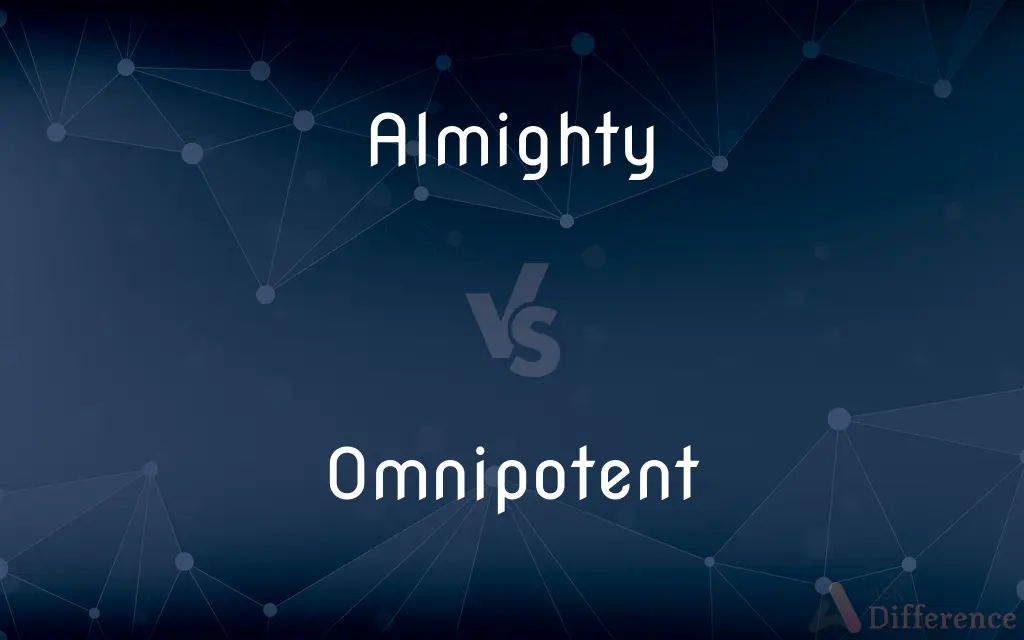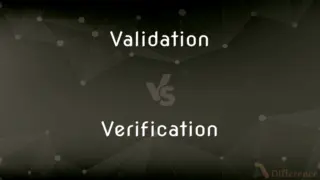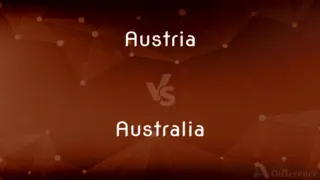Almighty vs. Omnipotent — What's the Difference?
Edited by Tayyaba Rehman — By Urooj Arif — Updated on April 25, 2024
"Almighty" refers broadly to supreme power or authority, often used in religious contexts to denote God's complete sovereignty; "omnipotent" is more specific, meaning having unlimited power and ability to do anything, describing an attribute of a deity.

Difference Between Almighty and Omnipotent
Table of Contents
ADVERTISEMENT
Key Differences
"Almighty" is a term that conveys vast, overarching power and authority, often implying not just strength but also dominance and control. On the other hand, "omnipotent" focuses specifically on the aspect of having unlimited and total power, particularly in the capability to perform any action.
While "almighty" is used primarily in a religious context to describe a supreme being such as God, denoting a status or position of unrivaled power, "omnipotent" is used to specifically describe the nature of this power as limitless. This makes omnipotence a subset of being almighty.
In literary and colloquial use, "almighty" can sometimes be used hyperbolically to describe something or someone extremely powerful or influential, beyond just theological use. Whereas, "omnipotent" remains a more formal term that retains its strict definition of having boundless power.
The concept of being "almighty" often includes not just power but also the wisdom, justice, and mercy associated with a deity's rule. In contrast, "omnipotent" merely describes the capacity for unlimited power, without implying wisdom or moral attributes.
"Almighty" therefore has broader implications, encompassing the idea of supreme authority and protective oversight. On the other hand, "omnipotent" speaks directly to the scope and extent of power, without additional connotations of governance or moral oversight.
ADVERTISEMENT
Comparison Chart
Definition
Supreme power and authority; dominion over all.
Unlimited power; ability to do anything.
Context
Primarily religious, describing a supreme deity.
Philosophical and theological.
Scope
Broad, includes power, authority, and sovereignty.
Specific, focuses solely on extent of power.
Usage
Can be hyperbolic in non-religious contexts.
Typically formal and specific to theology.
Implications
Suggests not just power but also protective rule.
Strictly about power, lacks moral or protective context.
Compare with Definitions
Almighty
Having complete power.
In many religions, God is referred to as the Almighty.
Omnipotent
Possessing unlimited power and able to do anything.
The omnipotent wizard could alter reality with his spells.
Almighty
Colloquially used to denote extreme power or influence.
The CEO's decision was seen as almighty in the company.
Omnipotent
Theological attribute of divine beings.
The doctrine states that the deity is omnipotent.
Almighty
Used to emphasize the magnitude of something.
He took on the almighty task of rebuilding the community.
Omnipotent
In literature, often associated with characters having god-like abilities.
The character in the novel is portrayed as nearly omnipotent.
Almighty
Supreme in power and authority.
The constitution vests an almost almighty power in the presidency.
Omnipotent
Rarely applied to humans or their institutions.
No leader, however influential, is truly omnipotent.
Almighty
Hyperbolically describing someone with significant control.
She is the almighty ruler of her team.
Omnipotent
Used in philosophy to discuss theoretical limits of power.
Debates about the paradoxes of omnipotence are common in philosophical texts.
Almighty
Having absolute power; all-powerful
Almighty God.
Omnipotent
Having unlimited or universal power, authority, or force; all-powerful.
Almighty
(Informal) Great; extreme
An almighty din.
Omnipotent
One having unlimited power or authority
The bureaucratic omnipotents.
Almighty
Used as an intensive
Almighty scared.
Omnipotent
Omnipotent God. Used with the.
Almighty
God. Used with the.
Omnipotent
Having unlimited power, force or authority.
Almighty
Unlimited in might; omnipotent; all-powerful
God almighty
Omnipotent
(biology) Describing a cell (especially a stem cell) that is capable of developing into any type of cell or forming any type of tissue (also called a totipotent cell).
Almighty
(slang) Great; extreme; terrible.
I heard an almighty crash and ran into the kitchen to see what had happened.
Omnipotent
An omnipotent being.
Almighty
(by extension) Having very great power, influence, etc.
The almighty press condemned him without trial.
Omnipotent
Able in every respect and for every work; unlimited in ability; all-powerful; almighty; as, the Being that can create worlds must be omnipotent.
God's will and pleasure and his omnipotent power.
Almighty
Extremely; thoroughly.
Omnipotent
Having unlimited power of a particular kind; as, omnipotent love.
Almighty
Unlimited in might; omnipotent; all-powerful; irresistible.
I am the Almighty God.
Omnipotent
Having unlimited power
Almighty
Great; extreme; terrible.
Poor Aroar can not live, and can not die, - so that he is in an almighty fix.
Almighty
Terms referring to the Judeo-Christian God
Almighty
Having unlimited power
Common Curiosities
How do different religions interpret the concept of Almighty?
Different religions interpret the Almighty with variations in characteristics like mercy, justice, and wisdom, though supreme power remains central.
What does it mean when we say God is Almighty?
Saying God is Almighty implies that He has supreme power and authority over all things and beings.
Is there a difference between Almighty and all-powerful?
While similar, "all-powerful" is closer in meaning to "omnipotent" focusing strictly on power, whereas "Almighty" includes aspects of sovereignty and dominion.
What are the limitations of using these terms in everyday language?
Using these terms outside their theological or philosophical contexts can lead to hyperbole or misunderstanding about their implications.
Can a person be truly omnipotent in literature?
In literature, characters may be depicted as omnipotent for narrative purposes, but this is within the fictional context of the story.
Can omnipotent beings make mistakes?
Theoretically, being omnipotent means having the power to do anything, which includes rectifying any action; thus, mistakes would not be a limitation.
Can an omnipotent being be Almighty?
Yes, omnipotence (unlimited power) is typically one aspect of being Almighty, which also encompasses supreme authority.
How do these terms impact theological debates?
These terms are central to debates about the nature of God, the problem of evil, and the scope of divine intervention.
What are the philosophical implications of omnipotence?
Philosophically, omnipotence raises questions about the nature of power, freedom, and the logical limits of doing anything.
Is the term "Almighty" ever used outside of religious contexts?
Yes, "Almighty" can be used hyperbolically in secular contexts to denote great power or influence, often exaggerated.
How do the terms affect the perception of divine figures?
These terms enhance the perception of divine figures by attributing to them the highest forms of power and authority, fostering reverence or awe.
How do these terms relate to human governance?
These terms are sometimes used metaphorically to describe absolute rule in human governance, though they originate in theology.
Are these concepts culturally universal?
Concepts of omnipotence and Almighty power are found in many cultures, though their interpretations and associated attributes may vary.
What historical impact have these concepts had?
Historically, concepts of Almighty and omnipotent beings have influenced governance, law, and cultural norms, often justifying the rule or authority of leaders.
What role do these terms play in ethical discussions?
In ethical discussions, these terms raise questions about the use and responsibility of absolute power.
Share Your Discovery

Previous Comparison
Validation vs. Verification
Next Comparison
Austria vs. AustraliaAuthor Spotlight
Written by
Urooj ArifUrooj is a skilled content writer at Ask Difference, known for her exceptional ability to simplify complex topics into engaging and informative content. With a passion for research and a flair for clear, concise writing, she consistently delivers articles that resonate with our diverse audience.
Edited by
Tayyaba RehmanTayyaba Rehman is a distinguished writer, currently serving as a primary contributor to askdifference.com. As a researcher in semantics and etymology, Tayyaba's passion for the complexity of languages and their distinctions has found a perfect home on the platform. Tayyaba delves into the intricacies of language, distinguishing between commonly confused words and phrases, thereby providing clarity for readers worldwide.














































